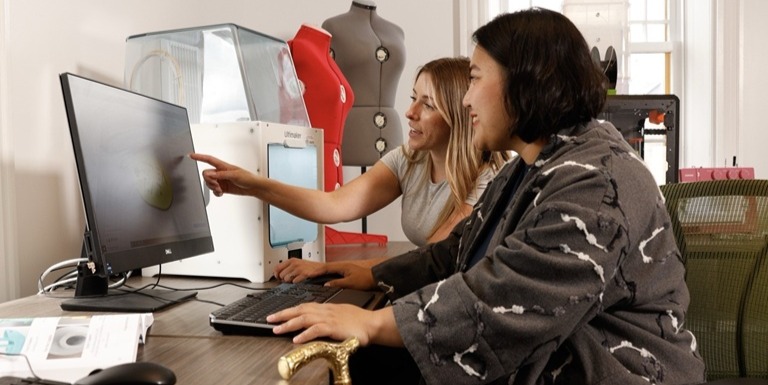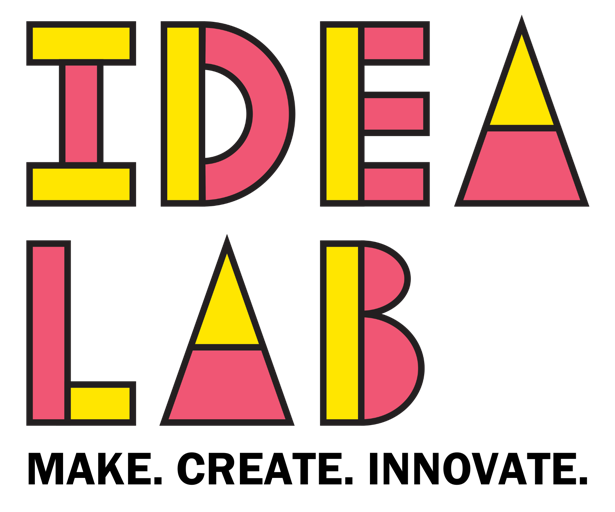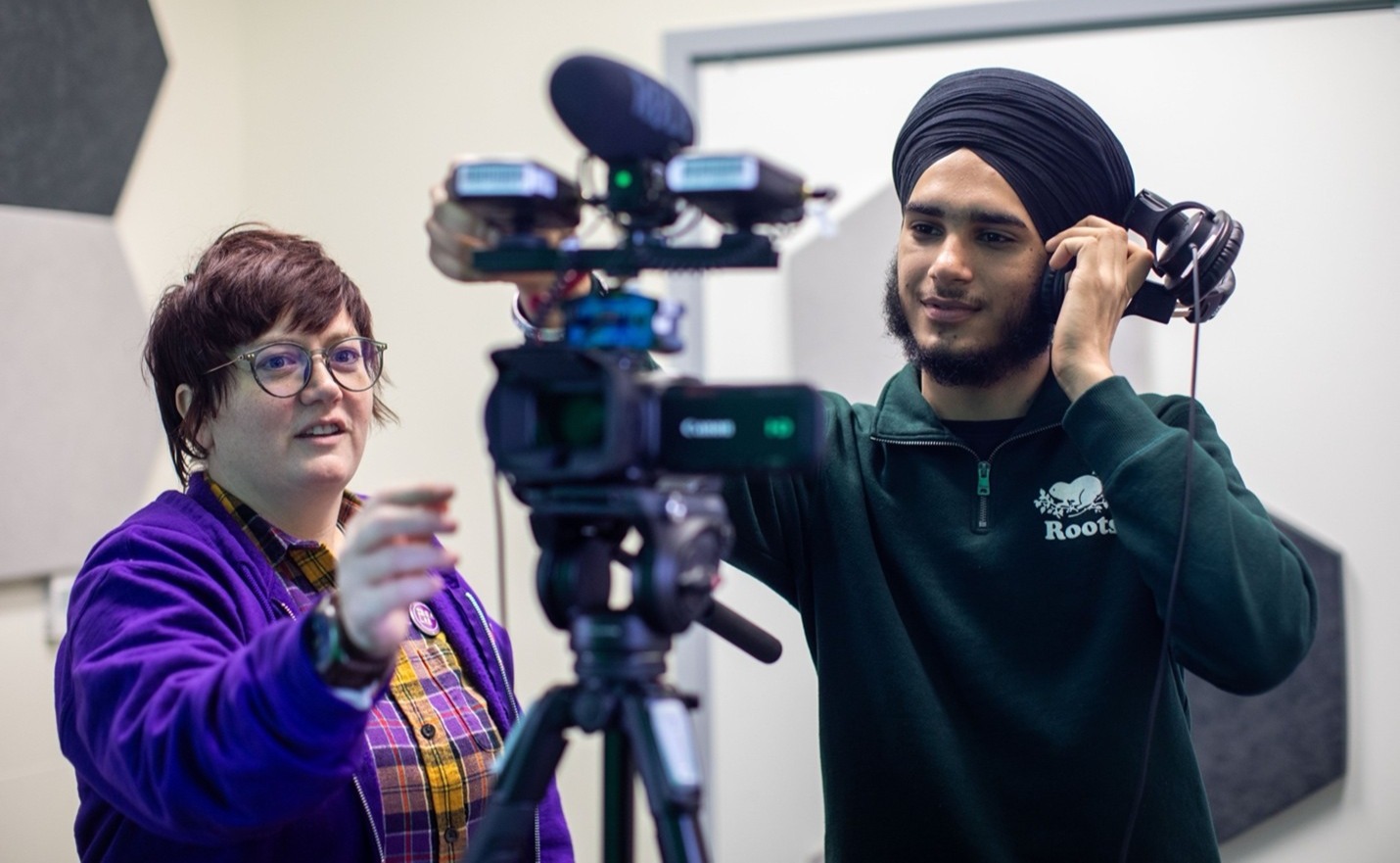Idea Lab: Make, Create, Innovate

Humber Polytechnic’s Idea Lab is a library initiative designed to support digital fluency skills development and media-rich assignments requiring fabrication, audio, video, photography, and more. Digital fluency was highlighted as a key skill-in-action in the Humber Learning Outcomes (HLO) framework, a pillar of the institution’s 2018-2023 strategic plan, designed to equip students “with the skills and perspectives they need to succeed as global citizens and professionals” (Humber Polytechnic, 2025, Humber Learning Outcomes section). Developing digital fluency is also the first priority in Humber's Digital Campus Plan and remains a key feature of the institution’s current Academic Plan. Digital fluency skills are in high demand by employers and their development fits perfectly into polytechnic education’s emphasis on applied learning. The Idea Lab fosters students' digital fluency skills by:
- Providing media studios and fabrication equipment
- Circulating equipment
- Offering workshops and assignment support
- Providing online learning resources
What began as an experiment in fall 2019 when two group study rooms were converted into small studios has become a comprehensive suite of spaces, equipment, resources, and services across two—soon to be three—campuses. How did the Idea Lab blossom into an integral part of the library’s offerings with over 6,600 studio bookings and 12,000 workshop attendees? This article describes the Idea Lab’s history and guiding philosophies.
Making a Start
The Humber library first envisioned what was to become the Idea Lab in 2018. The inspiration came from the institution’s inclusion of digital fluency in its HLO framework; through growing interest from faculty and students in alternative, authentic assignments; and as the makerspace and media lab movement in academic and public libraries grew. The beginnings were modest: two employees—a librarian and library technician—with a small portion of their roles dedicated to designing and planning the spaces and offerings, two group study rooms in the Learning Resource Centre at Humber’s North campus, and some equipment donated by the Centre for Innovative Learning. Over the following year, studio offerings were finalized, additional equipment was purchased, learning resources were created, and minor renovations were planned. Through consultation, a name was chosen, and a logo was designed by a Humber student (see Figure 1). The stage was set for the Idea Lab to open.

Idea Lab Logo
Creating Connections
Fundamental to success was a strategy to connect and collaborate with faculty. Assignment-related activity would encourage both volume and consistency of studio use. This effort would also help to ensure that students who otherwise might not gravitate toward this type of space would have an opportunity to discover and build on their digital fluency.
Promotion to faculty and resulting connections and collaborations were explored through several avenues. Humber’s Centre for Innovative Learning provided many opportunities to present the Idea Lab through their faculty workshop calendar, the Teaching Excellence Program, and events such as EdVenture Week and Showcase. These events typically involved exploring alternative assignment formats, such as podcasting and infographics, and promoting how the Idea Lab could support faculty and their students. Liaison librarians in the department also conducted outreach to professors and administrators in their program areas.
The Launch
At the beginning of the 2019 fall semester, the Idea Lab began offering open workshops and in-class workshops on topics such as creating animated videos and infographics. Student assistants were hired and trained in time for the studios to open in late October. Interest from both students and faculty grew and the winter semester was set to be a success. Then, in March 2020, the Idea Lab (along with the rest of the campus) closed in response to the COVID-19 pandemic. Thankfully, rather than simply surviving, the Idea Lab thrived. The number of in-class, open, and faculty workshops increased, as did attendance. But how was that possible?
Luckily, the majority of the assignments the Idea Lab supported at that time did not rely on studio spaces. These workshops on how to create infographics, animated videos, or websites were easy to reformat as webinars. For assignments intended to have studio support, such as creating podcasts, alternative tools and methods that allowed students to create and collaborate remotely were assessed and selected. The Idea Lab began to offer one-on-one virtual appointments for students working on digital assignments, which remain popular to this day. As the institution pivoted toward remote learning, the need for digital fluency support for students and faculty was clear. One benefit of the remote learning period was the ability to support faculty and students across the institution, regardless of campus. This helped build momentum for creating a second Idea Lab at Humber’s Lakeshore campus.
Ideating
From the beginning it was apparent the library at Lakeshore campus would not provide adequate space for studios or equipment matching what was currently on offer at the North Idea Lab. Just prior to the pandemic, the Library and Idea Lab met with the Longo Centre for Entrepreneurship (LCfE) to explore the possibility of using a room in their building. After an initial tour and discussion of possible locations, the LCfE offered not just a room but a whole floor. This presented an array of options and layouts that would help the Idea Lab not only match but build upon the offerings at the North location. Fortunately, the initial planning and promotion of the Lakeshore Idea Lab could continue throughout the pandemic.

Filming in the audio studio at North campus Idea Lab
Two plans were drawn up: The first mirrored the North Idea Lab, with an audio studio, video studio, and 3D printers; the second expanded on these offerings to include photography, laser and vinyl cutting, sewing machines, and circulating equipment. The two versions were reviewed at a series of presentations with key stakeholders across the institution. The encouragement to think big and expand was unanimous. Planning, purchasing, hiring, and training began immediately, leading to a soft launch of the Lakeshore Idea Lab in October 2022 and an official launch event in January 2023. The new space provides five rooms with a photo/video studio; podcast studio; music production studio; and two fabrication studios with 3D printers, vinyl cutters, laser cutters, and textile equipment.
Throughout the growth of the Idea Lab, the team that supports it has grown along with it. The initial librarian and library technician roles at North campus are now fully dedicated to the Idea Lab and equivalent roles have been introduced at the Lakeshore campus. The full-time team consists of two Digital Fluency Librarians focused on instruction and two Digital Fluency Specialists overseeing the spaces and systems. These roles are complemented by part-time Digital Fluency Advisors and other library team members who support the Idea Lab as part of their responsibilities. The team also includes student employees. These jobs provide an opportunity for students to use, build-upon, and share their skills and expertise with studio users. The roles, spaces, equipment, and services are guided by the following four philosophies, which have helped envisage, build, and maintain what the Idea Lab is today:
- Open to all
- Ease of access
- Needs-driven
- Academic assignments first
Open to All
While studio spaces and maker technologies such as 3D printing could already be found across Humber, these facilities are accessible only to students in specific programs. The library envisioned the Idea Lab as a place where equipment, spaces, and training could be open to students enrolled in any program. While the priority is assignment-related work, the Idea Lab spaces and resources are available to the entire Humber and University of Guelph-Humber community, including faculty and employees. Welcoming everyone helps foster a community approach to strengthening digital fluency.
Ease of Access
A core tenet in the design process was to make access to the Idea Labs as barrier-free as possible. A large part of this effort is offering the spaces and equipment free to use. “How much does this cost to use?” is a question frequently asked on Idea Lab tours. The answer, “Nothing!” is always met with relief. While some pieces of equipment (e.g., 3D printer, laser cutter) do require completion of a short tutorial or workshop prior to access, the majority of spaces and equipment can be reserved without prerequisite training.
When selecting equipment, software, and workflows, the Idea Lab strives to find a balance of quality and ease of use. By choosing tools with a shallow learning curve, students can begin creating immediately, thereby increasing engagement and helping students feel comfortable in the studio spaces while maximizing access to as many people as possible. Wherever possible, the Idea Lab selects software options that are free or freely available, be that open-source, freemium, or part of an institutionwide subscription.
As the Idea Lab supports students from programs that are not media or design focused, it is very important that the technology does not eclipse the content or learning outcomes for an assignment. The plan is that digital fluency is a skill acquired as a component of authentic assessment. The Idea Lab aims to provide equipment that yields high quality results with as little struggle as possible. While the equipment is accessible to beginners, it is also customizable to the needs of advanced users, as shown by the uptake from media and applied technology students and faculty.
As it is not always possible to have every student in every course utilize the spaces or equipment for their projects, the Idea Lab also highlights alternative methods and tools for creating content (e.g., using remote recording software for podcasts), alternate makerspaces (e.g., 3D printing at public libraries), and equipment that students can borrow and use off-campus and beyond studio hours.
Needs-Driven
The Idea Lab aims to support authentic assessments which align with program learning outcomes and Humber’s strategic plans as well as the evolving needs of industry and the workforce. Digital Fluency Librarians collaborate with faculty to explore, create, and customize their assignments, helping to navigate a variety of formats and tools, and develop rubrics. Input and feedback from a variety of stakeholders, including students, faculty, and administrators, continue to inform and shape the Idea Lab’s spaces, equipment, and services. Examples of recent authentic assessments include scanning and 3D printing shoeprints with the Forensic Identification program and making toys accessible using 3D printed switches with the Child and Youth Care program.
Academic Assignments First
While the Idea Lab supports nonacademic projects such as a personal podcast, music production, or photography, assignment-related work takes precedence. The Idea Lab believes that all learning is learning and recognizes the value of experimentation and creation outside of the classroom. Engaging in creative activities has both personal and academic benefits. However, from mid-semester on, the Idea Lab asks users booking for projects that are not course-related to wait until the day of the booking to make their reservation. This approach ensures that students’ academic success is the top priority.
Innovating
In the coming year, Humber will open its third Idea Lab at the Downtown campus. This venture will begin with a podcast studio and by circulating equipment for loan, including camera kits and audio interview kits. Also on the roadmap is an expansion of the Idea Lab studios at North campus. Increasing the footprint and creating an enclosed space will allow this location to match the breadth of equipment and services on offer at Lakeshore. Initial ideas include moving the video studio to a larger space that can support photography, adding an inventory of circulating equipment, and designing a modular learning space to accommodate a full class of students engaging in a variety of hands-on learning activities.
The Idea Lab continues to explore ways of collaborating with the Longo Centre for Entrepreneurship, the Library’s partner in creating the Lakeshore Idea Lab. This may be facilitated by extending access to LCfE program participants, who could be current students, alumni, or community entrepreneurs. Additionally, there is demand from the Idea Lab’s existing userbase of students and faculty to expand operating hours to include evening and weekend access.
In response to the growing demand for assignment support through workshops, the Idea Lab continues to expand and refresh its online resources. Staying current with technology changes, keeping up to date with the advances and limitations of free software, and responding to faculty requests for customized resources means the e-learning content cannot remain static. Through educator-focussed workshops, the Idea Lab aims to enable faculty to lead workshops themselves, particularly in areas not requiring specialized equipment or studio spaces, such as infographics, websites, and digital posters.
The Idea Lab continues to assess the impact of GenAI on its pedagogy, tools, and workflows. The question is, to borrow from the Idea Lab’s tagline, how does GenAI affect students’ ability to make, create, and innovate? Following Humber’s lead, the Idea Lab aims to explore and leverage AI tools without negating or replacing the experiential learning at the heart of making, creating, and innovating.
Reference
Humber Polytechnic. (2025). Humber learning outcomes in action. https://humber.ca/innovativelearning/humber-learning-outcomes-in-action
Lead image: 3D printing in the fabrication studios at the Lakeshore campus Idea Lab
Valerie Benigno is Digital Fluency Specialist; Ewan Gibson is Digital Fluency Librarian; Christopher Rugo is Library Learning Specialist; and Erin Walker is Digital Fluency Librarian at Humber Polytechnic in Ontario, Canada.
Opinions expressed in Learning Abstracts are those of the author(s) and do not necessarily reflect those of the League for Innovation in the Community College.










